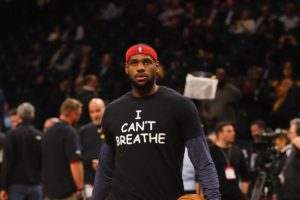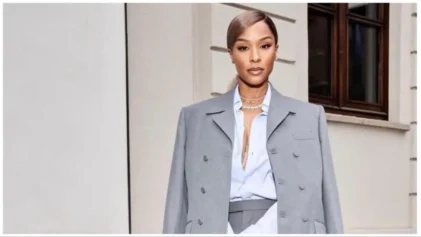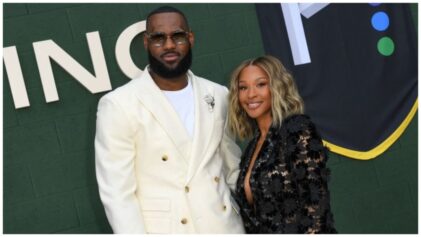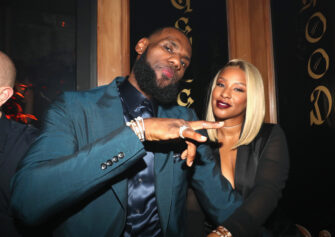What responsibility does the Black athlete have to speak on the pressing social issues of the day, such as #BlackLivesMatter and the killing of Black people by police? This is a question that arises after the recent statement of LeBron James of the Cleveland Cavaliers regarding the Tamir Rice case.
As ESPN reported, James weighed in on the decision of the Cuyahoga grand jury not to indict the Cleveland police officers in Tamir’s death. But his statement was disappointing and left much to be desired, for someone who has become more vocal on social issues. On Tuesday, LeBron said he did not have all of the information on the details of the case and was therefore slow to respond.
“For me, I’ve always been a guy who’s took pride in knowledge of every situation that I’ve ever spoke on,” James said following his winning game over the Denver Nuggets. “And to be honest, I haven’t really been on top of this issue. So it’s hard for me to comment. I understand that any lives that [are] lost, what we want more than anything is prayer and the best for the family, for anyone. But for me to comment on the situation, I don’t have enough knowledge about it,” he said. “There’s been the San Bernardino massacre, there’s been guys going in movie theaters, shooting up movie theaters, there’s been other issues. Those are not something that … I don’t have much knowledge of so I don’t speak about it.”
Meanwhile, a statement that the NBA star made a year ago indicates that he did know at least something about the fatal shooting case.
“It’s the same statement I made before,” James said in December 2014, according to ESPN. “It’s a sensitive subject right now. Violence is not the answer and retaliation isn’t the solution. As a society we just have to do better. I pray for the families of the lost ones. Obviously anytime you lose someone, it’s a downer for the whole family, and I’m not going to get too far involved in the logistics of the things because I’m not a part of it, but you pray for the families.”
Activist and writer Tariq Touré created the Twitter hashtag #NoJusticeNoLeBron, which was meant to urge LeBron to sit out and boycott his games in protest of the grand jury decision in the Tamir Rice case.
It’s more than a game and you know it. @KingJames #NoJusticeNoLebron for #TamirRice pic.twitter.com/usob6WvQJu
— TariqTouré (@TariqToure) December 29, 2015
#NoJusticeNoLebron go tell King James #TamirRice #BLACKLIVESMATTER — Rosa A. Clemente (@rosaclemente) December 29, 2015
The #Mizzou athletes BOYCOTT brought about change, and shutting down NBA and NFL games will bring change!!! #TamirRice #NoJusticeNoLebron
— Dave Jones (@kemba722) December 29, 2015
We wouldn’t have to tweet Muhammad Ali #NoJusticeNoLebron #TamirRice — Kwame Rose (@kwamerose) December 29, 2015
The #NoJusticeNoLebron movement is ignorant, insensitive and illogical. Stop the bullying: https://t.co/XtOHH94w6R pic.twitter.com/H0HRrRAAv3
— Sporting News NBA (@sn_nba) December 31, 2015
“I’m not much of a social media guy,” James said when asked about the campaign. “I’m on it, for sure, but I’m not always looking at what’s going on in it.”
Although one could argue that other Black athletes in addition to James should be urged to take a stand, his response to date has been vague and lackluster, for someone who in recent years has spoken up and spoken out on such matters. In 2012, when James was with the Miami Heat, he joined teammate Dwayne Wade and the rest of the team in wearing hoodies in memory of Trayvon Martin. The Heat posed in a photo with their heads bowed, and posted it on social media under the hashtag #wearetrayvonmartin.
This is a time when athletes, Black athletes, are being called upon–by activists and their conscience–to serve as more than modern-day gladiators or high-priced slaves, young bucks or field hands for the glittery, high-tech plantation of professional sports. We have not seen such displays of protest in the sporting world since the 1960s and early 1970s, one of the most prominent examples being the Black Power salute of the 1968 Summer Olympics in Mexico City.
In recent times, members of the St. Louis Rams engaged in a “hands up, don’t shoot” pose in solidarity with Ferguson and to protest the death of Michael Brown. Other players, including LeBron, wore “I Can’t Breathe” t-shirts and jerseys following the choking death of Eric Garner in New York. University of Missouri football players went on strike to protest racism on campus and to demand the resignation of the university president. This has led to Republican state lawmakers to introduce legislation to forbid college players from striking under penalty of forfeiture of their scholarship.
And Andrew Hawkins of the Cleveland Browns has received flak for wearing a black shirt reading “Justice for Tamir Rice and John Crawford III” on the front and “The Real Battle for Ohio” on the back.
“It’s pretty pathetic when athletes think they know the law,” said Cleveland Police Patrolman’s Association President Jeff Follmer said in a statement, according to Essence. “They should stick to what they know best on the field. The Cleveland police protect and serve the browns [sic] stadium and the browns [sic] organization owes us an apology.”
Hawkins, however, made his own statement.
“My wearing of the t-shirt wasn’t a stance against every police officer or every police department,” Hawkins said. “My wearing of the t-shirt was a stance against wrong individuals doing the wrong thing for the wrong reasons to innocent people.”
“The number 1 reason to me wearing that t-shirt is the thought of what happened to Tamir Rice happening to my little Austin scares the living hell out of me,” he added as his eyes filled with tears. “I made the conscious decision to wear the t-shirt. I feel like my heart was in the right place. I made peace with it. And those who disagree with me, this is America. That’s the point. Those who support me: I appreciate your support. But at the same time, support the causes and the people and the injustices that you feel strongly about. Stand up for them. Speak up for them.”
Meanwhile, former Cleveland Brown player and activist Jim Brown responded to #NoJusticeNoLeBron and the Tamir Rice decision. He said LeBron should make his own decisions.
“The problem that I’m looking at, Jason, is young, black men terrorizing their own community,” Brown said. “My thought of all of this, how it should be cleared up is to have the community take pride in itself, clean it up, be the cleanest community in the world. Fathers do the right things with their kids and their wives, and I think we’ll see a tremendous change.”
At a time when Black people have nothing to lose but their chains, thoughts about the loss of a player’s contract or a highly coveted product endorsement pale in comparison. And if Black athletes stand together, well, there is strength in numbers.
The burden of the Black athlete to speak truth to power does not rest solely on the shoulders of LeBron James. At the same time, Black players such as LeBron and others have a tremendous burden to bear. These days demand heavy lifting to deal with 21st century violence against Black bodies. And it’s important to recognize those who stuck their necks out in years past for the sake of the current generation of Black athletes with action.



